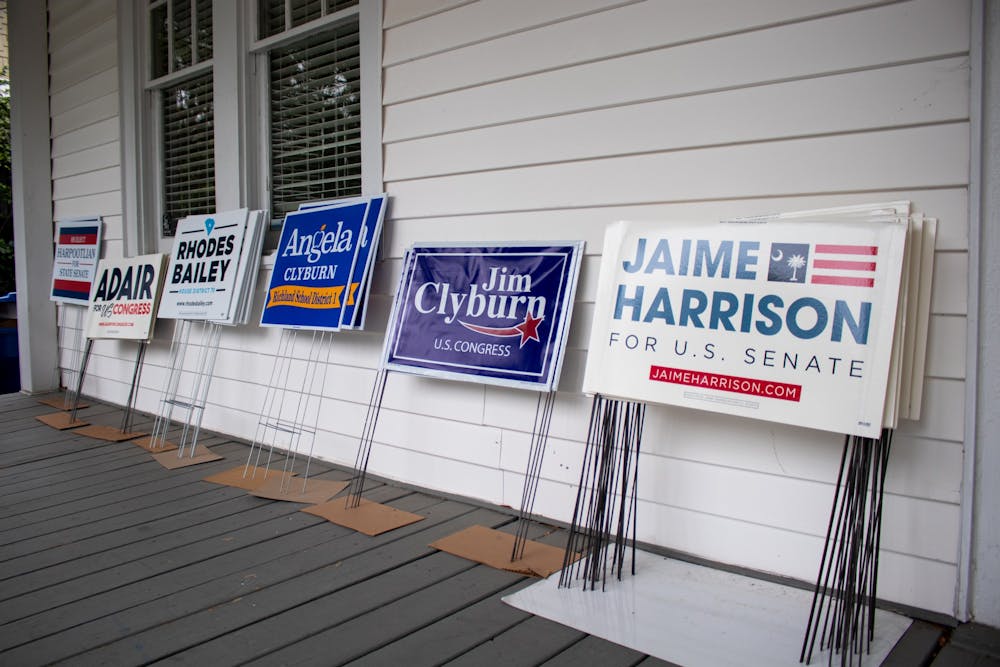In 21st Century America, what we understand is the two-party system - Democratic Party
versus Republican Party, red versus blue, donkey versus elephant - with little representation
for those who don’t wholeheartedly support either group, those elusive “independent
voters.” According to Diffen.com, The Democratic Party typically supports progressive
taxation, looser sanctions on immigration, and universal healthcare. The Republican
Party votes in favor of the “flat tax,” penalties for illegal immigration, and private healthcare.
However, the gray area between this black and white can seem dangerous or avant-garde
to those who have historically voted monolithically. Especially in these polarizing moments,
many have sought out an alternative to left or right, a third dimension, which typically takes
the form of the third party. To investigate the core beliefs and aspirations of these groups, I
spoke with Jake Sawyer, of the campus organization "Carolina Socialists," for their opinions
on the 2020 Socialist Party. In addition, I questioned Dylan Nolan, a Political Science
student here at UofSC, and self-proclaimed Libertarian. It is important to note that there are
more organizations than the Socialist and Libertarian Parties, but these two are quite
populous on our campus.
Q: How would you sum up the core beliefs and aspirations of your group?
SAWYER: The supremacy of global capitalism and all of the institutions that underpin it
can and must be abolished, and we are dedicated to building a movement with the goal of
said abolition.
NOLAN: Libertarians seek to devolve the vast power of the federal government and
maximize individual liberty.
Q: How does your party differ from the Republican Party and Democratic Party?
SAWYER: Neither Democrats nor Republicans represent the interests of the working class.
We are a group dedicated to direct advocacy for working-class interests. It is in the interest
of the working class to have full access to the fruits of their labor, to seize the housing,
agriculture, natural resources, industry, and defenses necessary for them to lead a life free of
scarcity and alienation. Socialists intend to build systems and organizations that advocate for
workers and against bosses and imperialist government. This is the fundamental distinction
between liberalism and socialism. Liberalism is fundamentally a capitalist ideology.
NOLAN: The Libertarian Party’s greatest difference from the Republican Party is that
Libertarians do not hold political power. While Republicans share many of the same core
values, their desire to remain in power prevents them from taking meaningful action on
issues like the national debt. Taking Grandma’s Social Security check wouldn’t get them
re-elected even if it is recognized that our debt per taxpayer is $216,772.
Q: What demographics do you think you most appeal to, and who would you like to get
more support from?
SAWYER: Most socialists do not intend to organize within the systems of liberal
democracy, because we all know capitalism cannot be overthrown with its own institutions.
With that being said, we hope that socialism appeals to the entire working class.
NOLAN: Libertarians are primarily conservatives who take an acute interest in issues of
personal freedom. I would like to get more support from the Republicans because they
share first principles with Libertarians. Generating grassroots Libertarian activism within the
Republican Party, similar to the 2009 Tea Party Movement, would force Republican
politicians to jettison political expediency in favor of true fiscal conservatism.
Q: Who is a promising potential candidate you would like to see run?
SAWYER: We are not focused on electoralism. We will, at some points, advocate on behalf
of a candidate who represents the interests of labor (few as they might be). But we are not in
the business of engaging in American politics. There are no socialist politicians in a capitalist
government because the prerequisite to being a politician in America is engaging in
American capitalism, imperialism, and the like. I personally am a fan of people like Lenin
and Castro, who at one time or another served as politicians. But, there aren’t any prominent
socialist politicians in America. Some of my comrades would say that there aren’t any
Socialist politicians at all and that socialism requires the complete abolition of the state. I
don’t agree with that notion, but I respect the argument.
NOLAN: My favorite libertarian is Kentucky senator Rand Paul. He is a Republican, but
when asked if he is a libertarian replied: "Libertarian would be a good description…because
libertarians believe in freedom in all aspects of your life – your economic life as well as your
social life as well as your personal life" Stewart, Martina (May 4, 2010). I strongly believe
that moving the Republican Party towards libertarianism is the way to affect meaningful
change. Rand is enough of a political insider to get things done, but is brave enough to
voice concerns over fiscal issues that many Republicans aren’t.
Q: Which of these beliefs do you think appeal to both sides of the aisle?
SAWYER: We will not compromise with reactionaries, we side fully with the working
class. The “both sides” are not Democrats and Republicans, it is workers and bosses, colonizers
and colonial people, imperialists and the victims of global imperialism.
NOLAN: Libertarians want the government out of your life all of the time. Libertarians
want you to have the freedom to use drugs should you choose to, don’t care who you have
sex with, or what gender you call yourself. To that end, libertarianism can appeal to liberals
who dislike social restrictions imposed by cultural conservatives.
Q: How can the two-party system be challenged?
SAWYER: Three or more parties under capitalism does not democracy make.
We have to move past these divisive political parties and focus on uniting workers under a
common cause. Let them lay claim to the products of their own labor.
Either way, we reject the premise of the question. A parliamentary system would not give
people any more power over their own lives, so why care if the Green Party gets a few seats
in Congress?
NOLAN: Drawing truly impartial district lines would challenge the current political order.
Currently, each party gerrymanders their districts to contain enough of their party to ensure
re-election, while trying to reduce the other party’s ability to win districts. This results in
elected officials not representing even slices of their states. Instead, they represent
cherrypicked groups. This means that they are not incentivized to compromise since they
don’t have constituents on both sides of the aisle in their districts.
Q: What will it take to get a third party candidate elected?
SAWYER: For a presidential election? A third party candidate can’t get elected. The system
is designed that way. The electoral college prevents third party viability by disallowing
plurality. Ralph Nader, for instance, didn’t functionally get a single vote, despite winning
about 3% of the vote. It’s not just the electoral college though. Democrats and Republicans
hold all political power here in the US and do all they can to keep it.
NOLAN: There is so much inertia in our current political dichotomy. It is like a train
traveling rapidly. There is no way of adding another car to the train unless the train comes
to a stop. I don’t see a third party candidate getting elected to the White House until a
paradigm-shifting event reveals the underlying flaws in how we operate our government.
Q: Do you have any last thoughts?
SAWYER: International imperialism and global finance cannot continue. And the
abhorrent people who run our political and economic system cannot hide from popular will
forever, and workers will take back the product of their labor. And with that act comes the
end of America as we know it.
NOLAN: I want to see the government get smaller, so I work for a Republican
congressman’s campaign, and frequently work with our state Republican party.
Libertarianism works best as a set of ideas rather than as a political party. Libertarians keep
the beautiful founding principles of personal liberty alive as the Hobbesian state reaches
further into our lives. Republicans serve as the practical, if sometimes flawed, bulwark
against complete statism.
As can be seen, third parties are not exempt from differing greatly from one another,
sometimes only coming together in their support of adding a viable third option to the
ballot. Both Nolan and Sawyer agree that a third party isn't viable in the current
state of our country, that monumental change is necessary in order to gain true recognition.
If you realize that you have more in common with either of these parties than you knew
before, I encourage you to look at their presence on a local level in your voting district and
consider joining a campus organization here at The University of South Carolina.



